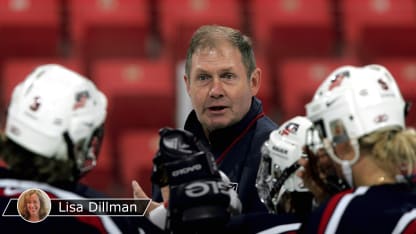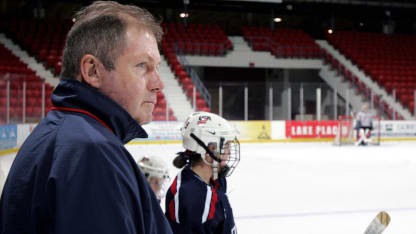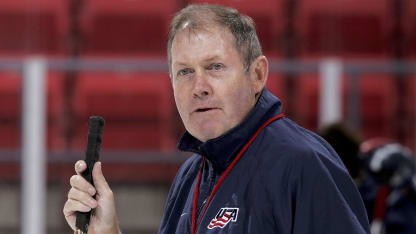Ben Smith was going down hockey's memory lane during a recent six-hour drive from his home in Gloucester, Massachusetts, to a game in Allentown, Pennsylvania, on his way to help USA Hockey with a scouting assignment.
Smith coached the U.S. Women's team at three Winter Olympics and won the first-ever gold medal in women's hockey in 1998 at Nagano, Japan.
As Smith spoke, he grew increasingly animated talking about Nagano; he almost seemed ready to get behind the bench again.
Passion for women's hockey fueled Smith's success
Three-time Olympic coach to be inducted into U.S. Hall of Fame

By
Lisa Dillman @reallisa / NHL.com Staff Writer
"One of the hardest things about coaching I've noticed over the years, and I've discussed it with Jack Parker, is when you lose a game, it's like a death in the family," said Smith, who will be inducted into the U.S. Hockey Hall of Fame at a ceremony in Boston on Wednesday.
"When you win a game, you feel like you've done your job. It's moments like this right now when I actually feel exhilarated about what that team did. Obviously, there was joy that we won. I know it wasn't an upset.
"Maybe it sounds like (New England Patriots coach Bill) Belichick, but we did our job. I don't think back on it that often but when I have to verbalize it, I find myself getting fired up."
One of the heartwarming aspects about Wednesday is that Smith gets to share it with his close friend and coaching mentor Parker, who is also an inductee along with retired NHL linesman Kevin Collins, former Anaheim Mighty Ducks, Washington Capitals, San Jose Sharks and Toronto Maple Leafs coach Ron Wilson, and Scott Young, who played in the NHL for 17 seasons.
RELATED: [Wilson gets U.S. HHOF nod -- again | Parker makes Hall after falling into coaching]
Smith's passion for hockey has not dimmed with the years, nor has his love for Boston's teams. His players remembered how his mood at practice would reflect the ups and downs of the Boston Red Sox or Patriots.
"If the Patriots or Red Sox lost, we were in a lot of trouble the next day at practice," said Natalie Darwitz, who played for Smith at the 2002 Salt Lake City Olympics and the 2006 Torino Olympics. She also played for coach Mark Johnson at the 2010 Vancouver Olympics.
"I thought, 'I'm not a Boston fan, but I'm going to cheer for the Patriots today because then practice will be better.' He'd be cranky or in the best mood in the world, based on both teams."
Smith was born in Gloucester, graduated from Harvard in 1968 and was an assistant at Yale and Boston University and coached at Dartmouth and Northeastern before coaching the U.S. Women's national team.
Darwitz was not on the 1998 Olympic team, but Karyn Bye-Dietz was in Nagano and scored a team-leading five goals in six games.
"He could rattle off some historical number of Red Sox players back in 1959, whatever," she said. "He was like a sports encyclopedia.
"The guy will never be away from hockey. If you can't find Ben Smith, start looking in arenas and you will probably find him."
Smith was amused by their recollections.
"I jammed a lot of Boston stuff down their throats over the years," he said. "They were strong. They were able to take it. That's the fun part of being around such great athletes, so recognizable when I first started to meet those kids in Lake Placid."
From an informal camp in Lake Placid in the summer of 1995 to Torino in 2006, Smith's impact was deep and lasting, helping to put women's hockey on the map in the United States.

© Jim McIsaac/Getty Images
"The success of a gold medal in Nagano was substantial," Darwitz said. "He had a significant role in the infancy of women's hockey and helped shape women's hockey, not just coaching the Olympics teams but being involved in the grass-roots programs."
Smith also would guide the U.S. to the silver medal in 2002 and the bronze in 2006. In 2005, he was the coach when the U.S. won gold at the IIHF Women's World Championship in Sweden. He was an assistant for the U.S. men's team at the 1988 Calgary Olympics, a team that featured Young, and is director of player personnel for the 2018 U.S. men's Olympic team.
Smith, 71, spent nine years as Parker's assistant at Boston University. He cited Parker and the late Tim Taylor as two of his biggest influences in coaching.
"Just the way (Taylor) lived his life and his love for the game, I felt like I was getting a graduate course in coaching," Smith said.
"Those would be the two guys I have leaned on in hockey and in life over the last 30 to 40 years. I feel like I was born with a silver stick in my hands."
When Smith received the call from USA Hockey executive director Pat Kelleher, notifying him about his induction, he politely told Kelleher it must be a mistake because Smith had been inducted into the Hall in 2009 with the 1998 Olympic team.
But the call was not an error.
"He said, 'No, this is exclusive of that,'" Smith said. "I said, 'Wow, I'm really honored.'"
Smith credited his late mother, Barbara Mecham, for getting him on the ice as a child. She was an accomplished tennis player, figure skater and avid sailor. His late father, Benjamin Smith, served as a U.S. senator for two years, filling the spot of his close friend and Harvard classmate John F. Kennedy after Kennedy was elected president in 1960. There is a memorable picture of Smith and his father with Kennedy at the White House in 1962.
"I could sail a boat blindfolded," Smith said. "I always kid people that my mom only taught me two things: how to skate and how to sail. People that know me well know those are the only two things I know how to do.
"My mom grew up in Lake Forest, Illinois, with three brothers. They all played hockey at Harvard. Dad was a football player. He was on the ice running around until we all got better."
Smith's wit and often-cryptic sayings kept his players guessing by design.

© Jim McIsaac/Getty Images
"The first time he coached our team was in '96, so nobody knew this guy," Bye-Dietz said. "We were getting ready for a game (in Finland) and the last thing he said to us, 'The hay is in the barn. Let's go.'
"He walks out the door and we all look at each other, 'The hay is in the barn?' After a while, we kind of figured it out … like your work is done. You're prepared. You're ready to go."
Bye-Dietz kept a journal detailing many of her experiences, including the gold-medal run in Nagano. The United States defeated Canada 3-1 in the gold-medal game.
"He just kept his cool," Bye-Dietz said. "I remember he would give you a compliment if you deserved it, but yet if you did something wrong, he would let you know that too.
"That's the sign of a good coach. You've got to take the negative with the positive. Or keep the positive with the negative. And he always said, 'I'm coaching hockey, not necessarily coaching boys or girls. I'm coaching hockey.'"
Darwitz said she still uses some of Smith's puck-movement drills with her women's team at Hamline University in St. Paul, Minnesota.
"You take bits and pieces of things you like from every one of those coaches," she said. "I do think Ben understood the game really well, the X's and O's, that aspect I definitely took to Hamline with me. That's one of his strengths. He did run some good practices about game situations."
Bye-Dietz is an assistant coach of the women's team at a high school in Hudson, Wisconsin; Darwitz took over the women's program last season at Hamline. She joked that her moods at hockey practice don't fluctuate with the success of the Minnesota Twins.
"It would be a long season, wouldn't it?" she said.
Smith now gets a charge of checking out the scores and chuckled, realizing his former players might be experiencing what he used to go through.
"Welcome to my world," he said.

















